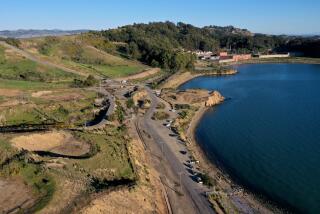Stirring of People Power Galvanize Hong Kongers
HONG KONG — Winston Chu is a man with a mission, an environmentalist fighting to keep the government from filling in more of Hong Kong’s beautiful harbor.
He recently collected more than $100,000 in five days to help finance a legal battle to halt the landfill work. Last week, he filed an application for a court hearing, then took his case to the media.
“Government officials regard the law as an inconvenience,” Chu, a lawyer, told reporters. “They do not think they need to respect the law the way they expect you and me to do.”
Elsewhere, Chu’s campaign might not attract much notice. But as support for his effort snowballs, it’s clear that he stands as a striking confirmation of the dramatic political shift many residents of this quasi-autonomous Chinese territory have sensed for weeks: People power has come to Hong Kong.
For the first time since the region was settled as a British colony in the 1840s, residents feel that they have the power to force political change. That has boosted confidence, stoked optimism and injected a perceptible feel-good vibe into the population.
The main catalyst for the change was a massive protest July 1 that brought nearly 10% of Hong Kong’s population of 7 million onto the streets and eventually forced the government to withdraw a controversial anti-subversion bill.
In the months since, the significance of that demonstration has grown rather than faded. With people enjoying their new feeling of empowerment, some even credit Hong Kong’s improved mood for helping lift the territory’s sagging property market and firming up its struggling stock exchange. It also has placed the government in an unfamiliar position: on the defensive.
“Hong Kong has never tasted people power before -- ever,” Chu said. “If the government makes mistakes, then people now know there is an alternative. There is people power to fall back on. I’m very lucky to be the beneficiary of this mood.”
Those who follow political developments in the territory now look back on the July demonstration as more than a protest. Increasingly, it is also seen as the celebration of a new feeling of community, a feeling forged by the shared fear of last spring’s outbreak of the SARS virus and by the collective frustration over what many people regard as an arrogant, incompetent government.
“Before July 1, people desperately wanted a government that could deliver, but didn’t feel they could do very much,” said Michael de Golyer, a political scientist at Hong Kong Baptist University. “Now they actually feel they can force the government to pay attention and change course.”
Somewhat belatedly, the government itself has begun to admit that life has changed.
“July 1 was a watershed,” Chief Secretary Donald Tsang, Hong Kong’s second-ranking government official, said this month. “We understand the people of Hong Kong were dissatisfied with the government.... We have done a transformation.”
Senior members of Chief Executive Tung Chee-hwa’s government appear to have taken up a “we are listening” mantra.
Thursday, his government bowed to public pressure and retreated on an order that would have forced dog owners to give up their pets as part of efforts to prevent a return of severe acute respiratory syndrome. Two days earlier, Tung shocked a clutch of protesters by stopping for several minutes to hear their complaints.
Chu, chairman of a group called the Society for the Protection of the Harbor, wants the government to stop landfill work pending a complete review of the endeavor. He says the government has ignored a July legal ruling that found the project violated a 1995 harbor protection law.
The government insists it has followed all necessary guidelines and has the right to keep going. Michael Suen, secretary for housing, planning and lands, also argues that to stop now would cost millions.
But there is little doubt that public sympathies lie with Chu and his effort to prevent further loss of a harbor that over the years has shrunk by nearly half. Last week he was inundated with donations when he spoke briefly in Hong Kong’s business district.
Sensing the flow of opinion running against the government, Suen announced Saturday that the government would stop dredging immediately, and pledged to abide by any court rulings. On Thursday, he hinted that existing landfill plans could be drastically reduced.
“I think we’re coming to an end of the reclamation of the harbor,” he said.
Political observers believe the new mood also will benefit groups seeking to open the territory’s limited democratic system to universal suffrage. At present, the chief executive is selected by 800 electors -- all of them approved by Beijing -- and fewer than half the 60 members of the Legislative Council are directly elected.
“It’s strengthened the democratic movement,” said Paul Harris, chairman of the Hong Kong Human Rights Monitor, a private group. “It’s made those in the middle ground shift in favor of direct elections.”
*
Tammy Wong in The Times’ Hong Kong Bureau contributed to this report.
More to Read
Sign up for Essential California
The most important California stories and recommendations in your inbox every morning.
You may occasionally receive promotional content from the Los Angeles Times.










